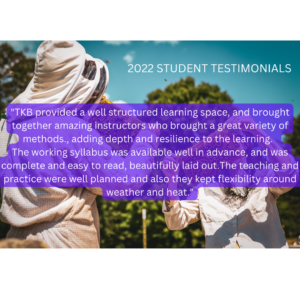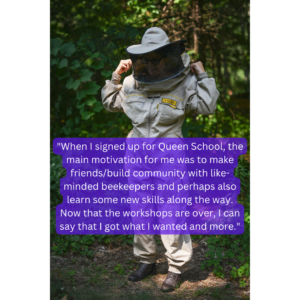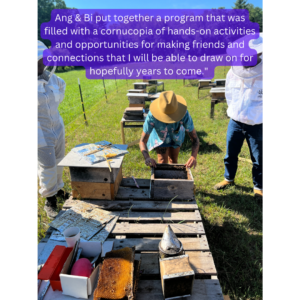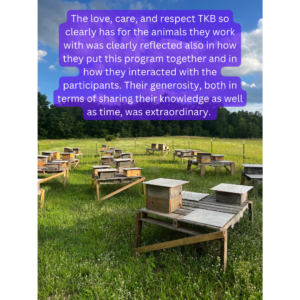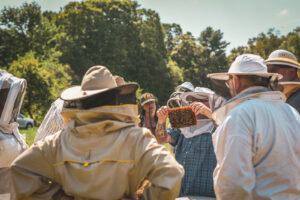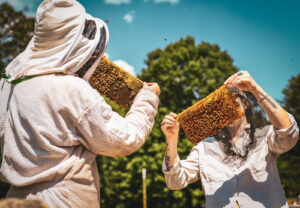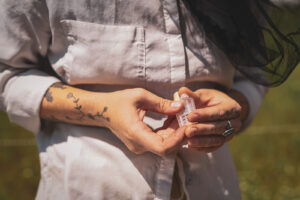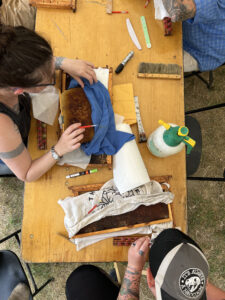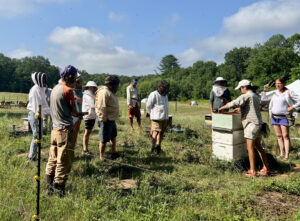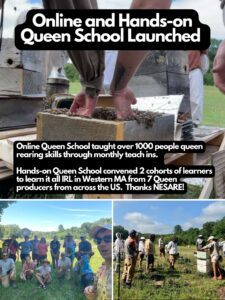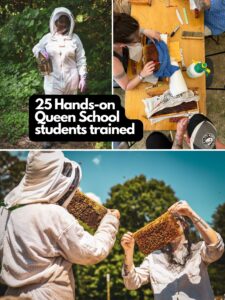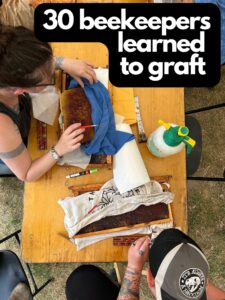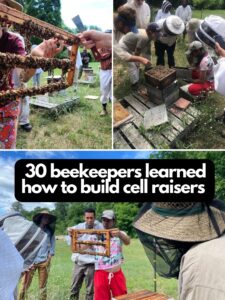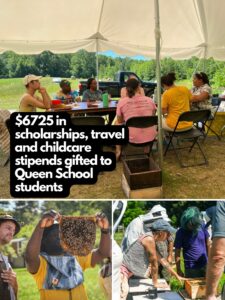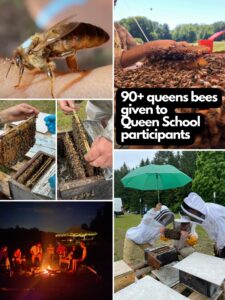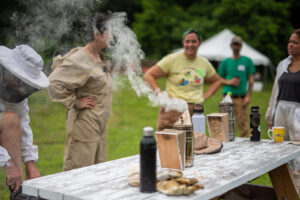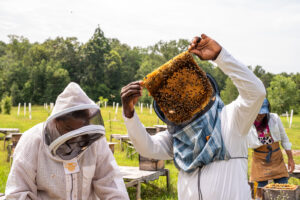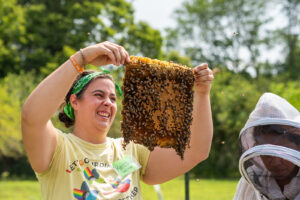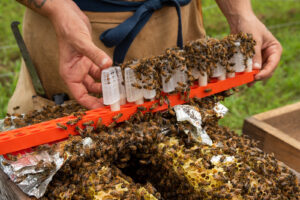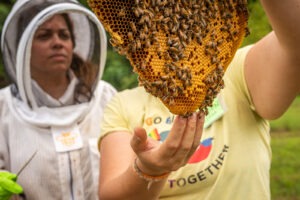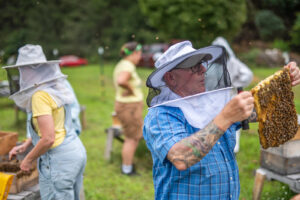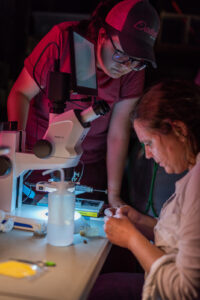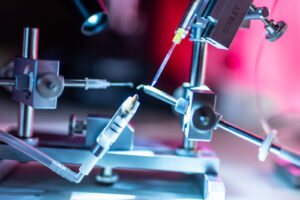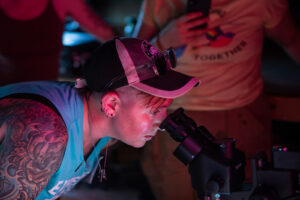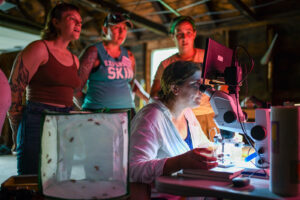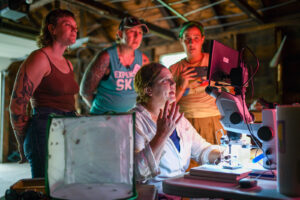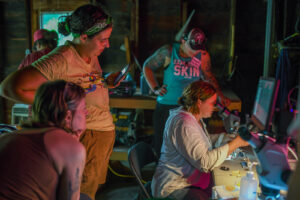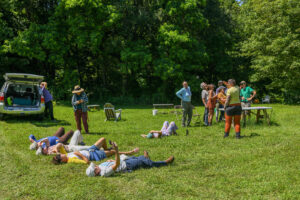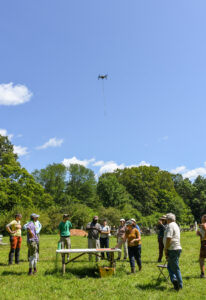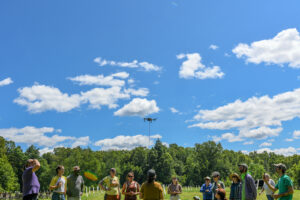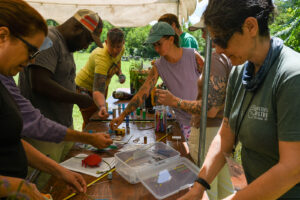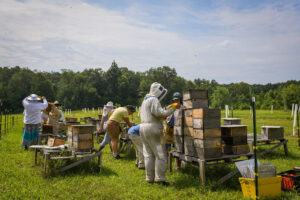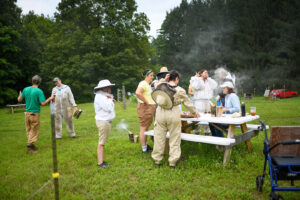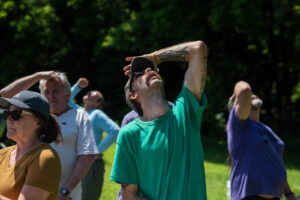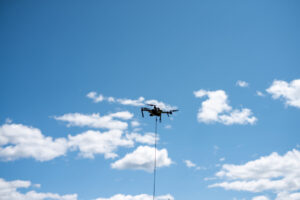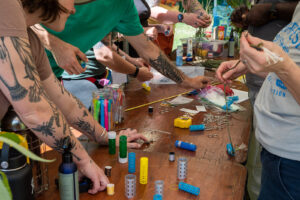Final report for LNE21-422
Project Information
This project helped address a critical gap between rising interest in queen rearing as a pathway to sustainable apiary management and a lack of resources and education available in the Northeast region for beekeepers who are ready to practice rearing their own queens.
Northeast beekeepers self-identified a gap in learning about the expansion of their own apiary through queen-rearing when initially surveyed. The subsequent demand for both online and in person Queen School courses verified that need. 2,514 beekeepers visited the Queen School website throughout the course of this project. 52 Beekeepers applied for the initial hands on cohort and 39 beekeepers applied for the second hands on cohort.
Our programming addressed the demand for queen rearing education first by providing live and asynchronous online courses presented by professional queen breeders & queen producers from across North America. 1,865 beekeepers attended or streamed the online courses. Next, They Keep Bees designed and implemented hands-on, in-person opportunities for Northeast beekeepers to learn specialized queen-rearing and hive expansion techniques. 36 beekeepers attended Hands-on sessions in queen production in 2022 and 2023. 19 returning and new student beekeepers attended an advanced session where we demonstrated Instrumental Insemination with Megan Mahoney and learned about Drone Congregation areas from Julia Mahood.
Participants provided feedback of the program efficacy through self reported post-assessments and evaluations which impacted our design and implementation. For example, in 2023 a demand for more advanced learning was met by presenting a special session on Instrumental Insemination and Drone Congregation areas to give returning students and advanced participants the opportunity to witness the complexity of Queen Breeding as a practice when compared to Queen Rearing and expand their understanding of queen production methods.
During the hands-on workshops data was collected by program facilitators to evaluate the effectiveness of our teaching strategies by evaluating the take, or number of successful queens produced, within the Queen Rearing system.
Queen School facilitators took a hands-on, experiential learning approach and maintained consideration of accessibility, differentiated learning styles, and responsiveness to participant needs. Farmers adopted a variety of new practices to reach goals around hive expansion and mite control. 100% of participants in 2022 reported confidence performing a walk-away split, and 85% of participants reported attempting to make walk-away splits in their own apiaries in 2023. 12 out of 16 participants reported they were "very confident" in making 48-hour queen cells in 2022, and 14 out of 20 participants reported attempting to graft their own 48-hour cells in 2023. 100% of students reported raising at least 2 queens in their own apiaries using one of the above methods for queen production for a total of $2520 in potential revenue from queen production.
Throughout the course students capacity to produce queens was evaluated based on "mating success" or the number of queens produced after each method was implemented.
A total of 292 splits were made between May and August of 2022. Of the 292 splits, 187 (64%) were successful and resulted in 187 queen bees. A total of 87 splits were made over the testing period (May to August 2023) for a total of 87 (100%). Of the 87 splits, 70 (80.5%) were successful- resulting in a mated queen bee, 9 (10.3%) were failures and the remaining 8 (9.2%) had no data reported. Throughout the duration of this course a total of 257 queens were produced by students in this course from their own selected stock for a total of $8,995 in potential revenue.
A participant of the 2022 cohort reported, "I learned more than enough to be successful raising my own queens. The walkway method and grafting was very instrumental to me. The instructors and guest speakers were the best of the best. Highly recommend any beekeeper to take this course."
100 beekeepers will adopt “generative beekeeping practices” which includes innovative methods of hive expansion and mite control: the 48-hour queen cell approach and the simplified alternative “Walk-Away Split”.
Each of the 100 beekeepers who complete the program will produce 50 queen bees from their own selected stock over the course of 2 seasons. In total participants will produce 5,000 Northern hardy queen bees or $175,000 in potential revenue from queen bee sales in the Northeast region.
In 2019 “Bee Informed Partnership” (BIP) reported that Northeast beekeepers lost an average of 29% of 12,502 colonies managed by 515 beekeepers. Beekeepers in the Northeast have been combatting the ongoing pressure of the Varroa mite on an annual basis (Kulhanek, 2019).
In 2014, Erin MacGregor-Forbes discovered honey bee hives populated by northern-adapted queens survive winter nearly twice as well as hives with southern queens. This suggests that rearing northern queens could improve the biological and financial sustainability of beekeeping in the Northeast.
In a 2018 survey of 116 Northeast beekeepers, 109 beekeepers expressed interest in learning queen-rearing for a small scale apiary (Roell, 2020). We understood this as a regional demand for queen-rearing education.
Currently there are limited options for beekeepers within the Northeast region to pursue an extensive queen-rearing program. While Cornell University offers a Master Beekeeping program and “Northeast IPM” offers great information on Varroa interventions, there currently is no explicit program offering queen-rearing and hive production methods, how to breed through the issue of Varroa, and how to use and mimic bee biology to increase hive survival.
Our project proposed the development of an educational program that taught students “generative beekeeping practices”. We instructed on both the innovative (48-hour cell method, and the “Walk-Away Split” method) and traditional (10 day) queen-rearing techniques. Students worked collaboratively to manage hives through the entirety of the queen-rearing process. To culminate this process students raised their own hive, becoming invested in the queen rearing process as a result. This process became regenerative as the advancing class raises bees provided to the next cohort, with the support of the They Keep Bees team for over wintering management.
In previous research we hypothesized that our alternative queen-rearing methods (48-hour, “Walk-Away Split”) would contribute to a reduced Varroa mite population. The extra time queenless extends a break in the bee brood cycle and interrupts the mite reproduction process. These methods could ensure a percentage of hive survival, especially while breeding for local adaptation. We invited new beekeepers to create and continue their own adaptive apiary, generating new queens every year.
Our program offered a season-long, hands-on experience of learning the intricacies of the queen-rearing process & hive care, as well as a post-skill building workshop to discuss the financial feasibility of a queen-rearing and nucleus colony production enterprise. Participants from the first cohort were invited back the second year to share their knowledge and experience with the second cohort while developing new skills in advanced methods such as Instrumental Insemination and mapping Drone Congregation Areas (DCAs) a means of strengthening and expanding the regional beekeeping community.
These workshops encouraged beekeepers within the region to share knowledge and resources both during their participation in the workshops, and beyond, as students stay connected with each other and the instructors via a private WhatsApp chat community.
Cooperators
- (Educator)
Research
Education
The educational approach used in this project hinges on the importance of "participatory" education, i.e., building a program for and by the people who need it most. While we know there is a lot of interest in queen production, it is often difficult for people to access expertise in a way that meets their own scheduling realities.
Using our previous NESARE research results and outreach materials as a jumping off point we asked for input from current beekeepers to understand needs and capacity. We talked to beekeepers in the region from small scale to commercial scale through one-on-one visits and informational interviews. We spoke to beekeepers in NY, PA, VT, MA and RI to determine how to make the program work well for them. We spoke with our own advisors in Vermont and Massachusetts about how to make the program accessible and effective. We consulted with a culture-building consultant about how to shape the culture of Queen School, both online and in-person. We identified our key values, and strategies for welcoming people into the space. We built infrastructure to support people in Hands-on Cohorts including a composting toilet, wooden tables, a large event tent, and a bee yard where all of the hives students' work will be housed.
Through networks and relationships, we performed outreach to queen producing beekeepers across the US, who agreed to be guest speakers for each of the four online sessions we implemented, as well as in-person guest speakers. Online sessions combined narrative/storytelling and biological apiary management strategy to discuss how each queen producer performs their work and achieves their success.
Online Queen School sessions were broadcast live on the following dates, and shared with those who expressed interest in follow-up programming emails.
2022:
2023:
Our Hands-On Queen School sessions covered a wide range of topics, including but not limited to,
- Hive building/construction
- Hive inspection and evaluation techniques
- Making walk-away/run-away splits (apiary expansion techniques)
- Catching queens
- Evaluating split health and size
- Grafting
- Building cell-raisers
- Building queen-banks and banking queens effectively
- Drone catching, semen extraction demonstration
- Instrumental insemination demonstration
2022 Hands-on Queen School sessions
Guest Instructors: Michelle Mejia, Melanie Kirby, Tucka Saville, Sarah Blackburn, Sam Comfort
- 5/27-5/29 Both Cohorts
- 6/17-6/19 Cohort 1
- 6/24-6/26 Cohort 2
- 7/8-7/10 Cohort 1
- 7/15-7/17 Cohort 2
- 8/5-8/7 Both Cohorts
2023 Hands-On Queen School sessions
Guest Instructors: Melanie Kirby, Megan Mahoney, Julia Mahood
- 5/27-5/28 Both Cohorts
- 7/1-7/2 Both Cohorts
- 7/29-7/30 (Advanced Session) Both Cohorts as well as past participants invited from prior year's group to attend
The instructional approach for Hands-on Queen School focused heavily on participatory and experiential learning methods. Each day began with a circle up, defining our goals and terms, summary of what we would learn that day, and Q&A. Students were expected to receive instruction regarding the educational topic, and then implement and apply learned techniques directly in the provided hives that students managed with instructor support. Students partnered or worked in small groups to manage hives, and debriefed with one another to integrate their learning. Students actively participated in all elements of queen production including: evaluating and selecting mother queens for grafting, splitting hives, catching and marking queens, preparing mating nucs, preparing a grafting station, grafting, preparing cell raisers, placing grafts in cell raisers, monitoring cells for success and transferring cells from cell raisers to mating nucs. In this way students saw the full cycle of queen production for each queen rearing method.
Question and answer sessions followed each hands on activity, and students were given summary guides to take home for reference both on paper and digitally. Students were provided time after work sessions to pose inquiries to instructors, each other, and receive feedback. Feedback surveys were sent following each session to collect data on student experience, content and comprehension. Lessons were reinforced if student understanding showed demonstrated difficulty (less than 60% comprehension).
Queen School included several lecture sessions to reinforce and build upon student understanding. These sessions were responsive to student interest as indicated on feedback forms, and took place at the instructional site. Sessions included: Small Apiary Viability with Michelle Mejia in 2022 and Ang Roell in 2023, Diverse Queen Genetic Origins with Melanie Kirby, Queen Production Calendar Mapping with Ang Roell & Bi Kline, Selection Methods for Instrumental Insemination with Megan Mahoney, and The Importance of Drones and Finding Your Drone Congregation Areas with Julia Mahood. Each guest instructor was introduced and given time to tell their own beekeeping history and current practice to build context and connection with the group. Each lecture was followed by a question and answer session to integrate learning.
Student feedback was instrumental in guiding course content throughout Hands-on Queen School. For example, 2022 students expressed their desire to learn from more women, queer and non-binary instructors to foster a more supportive environment. The line-up of instructors shifted as a result of this feedback.
Student feedback about a desire for more in depth learning about Queen Breeding led to an advanced session offered in 2023 included a hands-on demonstration of Instrumental Insemination and Drone Semen Extraction by Megan Mahoney and Ellen Topitzhofer under microscope cameras. A demonstration of how to find and map your Drone Congregation Area was offered with Julia Mahood.
Milestones
During our planning year, we will conduct outreach to beginning and intermediate beekeepers using the following outreach tools: social media channels, business newsletter, phone calls, beekeeping associations, webinars, etc. We anticipate that 3,000 beekeepers will hear about our project in year one.
3000
1955
December 31, 2021
Completed
January 31, 2022
During our planning year, we conducted outreach to beginning and intermediate beekeepers using the following outreach tools: social media channels, business newsletters, contacting beekeeping associations, and webinars, in person meetings.
As of January 20th, 2022, 321 "farmers" signed up for the Online Queen School Webinar starting on January 24th about the systems and functions of generative beekeeping. We've combined the digital courses into one meeting based on the feedback of attendees, and purchased a "large meetings" add on to our Zoom account, so more people could attend one session.
The back-end of our web hosting server indicates that 1,251 people visited our Queen School website.
On Facebook, we reached out to Boston Beekeepers Association, Massachusetts Beekeepers Association, Vermont Beekeepers Association, Northeast Beekeeping, New England Beekeeping, New Hampshire Beekeeping.
We spoke with both Boston and Maryland Beekeeping Associations. Each club had 50+ members on the nights we discussed Queen School.
With an eye to equity, we outreached to the following marginalized listservs: SoulFire Farm, Northeast Farmers of Color Land Trust, Rocksteady Farm, SuSu Community Farm, Eastern Woodland Rematriation, Nipmuc Indian Development Corporation, Hunneebee Project, Northeast Queer Farmers Listserv, Queer Farmers Listserv, Boston Urban Farming Institute, Nuestras Raices.
We reached out the following additional listservs: Emasscraft, National Young Farmers, Northeast Farm Service Providers, Western MA Permaculture.
Systems and Functions of Generative Beekeeping:
Two Cohorts of 75 beekeepers will complete (2) digital courses on Bee/Mite Biology Interactions in Management Systems by January 1st, 2022, January 1st 2023 for Cohort 2.
Verification will include a post-assessment survey of course content and delivery.
150
1955
January 01, 2023
Completed
Online Queen School Webinar 1 begins on January 24th about the systems and functions of generative beekeeping. We've combined the digital courses into one meeting based on the feedback of attendees, and purchased a "large meetings" add on to our Zoom account, so more people could attend one session.
120 people attended, 77 people completed the assessment.
Students who attended this introduction to Queen Rearing & Bee/Mite Biology Interactions in Management Systems reported the following lessons they are taking back to their own apiaries
- Walk away splits are a viable way to raise a queen and initiate a brood break to help bees manage mites naturally
- Integrated pest management can include both chemical and nonchemical (management) strategies
- Alternative hive designs offer an opportunity to build up apiary numbers quickly and sustainably (cost effective, easy to build)
- Sourcing local bee stock is important
- Keeping a schedule for queen production is important
- Keeping good notes assessing hives and queens is important for selection of the best queens for breeding
76% of students who attended reported the course was "useful or very useful" to their beekeeping practice.
Course materials were sent out as asynchronous learning material for FREE to all who enrolled/registered (321 total).
Registered students will receive the asynchronous learning materials after the session is complete so people who can not attend in person can attend on their own time and be ready for Session two in February.
We anticipated 100 attendees and received 120 attendees.
2023: Online Queen School Webinar 1, 2023 began on February 15th about the systems and functions of generative beekeeping. The digital course was available live and recorded for asynchronous learning.
135 people attended, 63 people completed the assessment.
Students who attended this introduction to Queen Rearing & Bee/Mite Biology Interactions in Management Systems reported the following lessons they are taking back to their own apiaries
- Walk away splits are a viable way to raise a queen and initiate a brood break to help bees manage mites naturally
- Integrated pest management can include both chemical and nonchemical (management) strategies
- Alternative hive designs offer an opportunity to build up apiary numbers quickly and sustainably (cost effective, easy to build)
- Sourcing local bee stock is important
- Keeping a schedule for queen production is important
- 48 hour cells as an efficient strategy for raising queens
- Differentiation between 10-day and 48-hour cells
- Significance of drones within the queen production system
- Keeping good notes assessing hives and queens is important for selection of the best queens for breeding
79% of students who attended reported the course was "useful or very useful" to their beekeeping practice.
Course materials were sent out as asynchronous learning material for FREE to all who enrolled/registered (1,955 total).
We anticipated 100 attendees and received 135 attendees.
Biology of Queen Production:
Two Cohorts of 75 beekeepers will complete (2) digital courses on the Mating Biology of the Honeybee Queen by February 1st, 2022, February 1st 2023 for Cohort 2.
Verification will include a post-assessment of course content and delivery.
150
1955
February 01, 2023
Completed
915 beekeepers attended or watched one 90-minute (including a Q&A) recording of our digital online Queen School presentation on Applying Mating Biology to Queen Production Systems in February of 2022, presented by Bi Kline and Ang Roell. Of the 915 total, only 24 people who attended completed post-evaluation assessments with feedback due to technical issues with the Zoom platform, evaluations could not be collected during the class session and had to be retrieved after the session ended. 87% identified this presentation as useful to their beekeeping practice. Students reported the following learning,
Understanding of comparison between walk-away splits and grafting,
Understanding of 10-day and 2-day cell development process,
Efficacy and flexibility of walk-away splits and producing high quality queens.
We anticipated 150 attendants and 915 attended, far exceeding our expectations for the class.
2023: We combined the digital courses into one meeting based on the feedback of attendees and purchased a "large meetings" add on to our Zoom account, so more people could attend one session.
1,955 beekeepers attended or watched one 90-minute (including a Q&A) recording of our digital online Queen School presentation on “Community Hive: Collaborative Purchasing Partnership Leads to Sustainable Queen and Nuc Production”, March 15 of 2023, presented by Eliese Watson and Bill Stagg. Of the 1,955 total, only 17 people who attended completed post-evaluation assessments with feedback due to technical issues with the Zoom platform. Evaluations could not be collected during the class session and had to be retrieved after the session ended.
93% identified this presentation as useful to their beekeeping practice. Students reported the following learning,
- How to assess colonies and identify possible breeder colonies.
- How to split one hive into many mating nucs to achieve the goal of creating many places for queen cells. Bill broke down a method for making 8 mating nucs from four hives.
- How to make splits while equalizing hives.
- The importance of monitoring for drone brood and then sexually mature drones before beginning the queen rearing process.
- The importance of monitoring climate maps as guidelines for feeding, splitting and eventually queen grafting.
- How to set a schedule based on past seasons with some flexibility for new circumstances
We anticipated 150 attendants and 1,955 attended live or watched the recording, far exceeding our expectations for the class.
Systems for Production:
Two Cohorts of 75 beekeepers will complete (2) digital courses on Applying Mating Biology to Queen Production Systems by March 1st, 2022 for Cohort 1, March 1st 2023 for Cohort 2.
Verification will include a post-assessment survey of course content and delivery.
150
1955
March 01, 2023
Completed
1,955 beekeepers attended or watched one 90-minute (including a Q&A) recording of our digital online Queen School presentation on Applying Mating Biology to Queen Production Systems in March and April of 2022, presented by Melanie Kirby (March), and Meghan Mahoney (April). In March, of the 915 total attendees, 45 completed the feedback form. 80% identified this presentation as useful to their beekeeping practice. In April, of the 915 total attendees, 23 completed the feedback form (this was an advanced presentation on selection and instrumental insemination, but was highly valued by those who had prior queen rearing experience). 91% identified this presentation as useful to their beekeeping practice.
Students in March reported the following learning,
History of apis melifera,
Defining selection protocols, including longevity, bioregional survivability,
How to orient adaptive bee-breeding around successful long-living queens,
Importance of regional adaptation,
Queen overwintering strategies,
How to propagate locally mated queens,
Importance of nutrition for high-quality queens,
Students in April reported the following learning,
Queen evaluation methods,
Instrumental insemination,
Queen banking techniques,
How to make cell-builders, both queenright and queenless,
Criteria for selection,
Grading queens,
Importance of drones and drone genetics in queen production.
We anticipated 150 attendants and 915 attended, far exceeding our expectations for the class.
2023: We combined the digital courses into one meeting based on the feedback of attendees, and purchased a "large meetings" add on to our Zoom account, so more people could attend one session.
1,955 beekeepers attended or watched one 90-minute (including a Q&A) recording of our digital online Queen School presentation on “Sustainable Queen Production in a Migratory Apiary” on April 13th, presented by Tucka Saville. Of the 1,955 total attendees, 35 completed the feedback form. 85% identified this presentation as useful to their beekeeping practice. Students in March reported the following learning,
- Techniques for building successful cell-raisers
- How to create “brood factories” to keep cell-raisers strong
- Difference between a queen-right and queen-less cell raiser
- How to identify graftable larvae age for grafting
- Searching for rogue cells within cell-raiser before grafting
- Shaking in nurse bees to bolster cell-raiser population
We anticipated 150 attendants and 1,955 attended, far exceeding our expectations for the class.
Walk-Away Splits:
Two Cohorts of 50 beekeepers divided into two hand on teaching groups of 25 will apply the “Walk-Away Split” method to one hive each in the teaching apiary. June 2022 for Cohort 1, June 2023 for Cohort 2. Verification will include, with instructor guidance, peer teams of two assessing the success of the applied method by July 2022/July 2023, using the supplied Split Analysis Tool in the sample Verification Tool.
100
47
July 12, 2023
Completed
In May of 2022, 30 students attended classes (including 25 enrolled students as well as 5 guest attendees). In this class, we learned how to construct comfort hives as well as make walk-away splits. Students made 96 walk-away splits over the course of the weekend. 72.9% of walk-away splits were successful based on the verification tool used by teams of students and checked by the teaching team.
25 students were surveyed using a summative evaluation to determine their success in hands-on queen school. Of those, 16 students reported being very confident in making walk-away splits and building comfort hives.
We offered enrollment slots to 50 beekeepers, and 25 beekeepers were able to attend. When surveyed, students reported the following limitations to attendance; scheduling (too many classes to commit to throughout the season), high travel and gas expenses that extended beyond the travel stipends we were able to offer low-income students, difficulties with securing accommodations. We planned to respond to this in 2023 by having less in-person course dates and more budget allotted for offsetting travel cost.
2023: In May of 2023, 17 students attended classes. In this class, we learned how to successfully make walk-away splits. Students made 29 walk-away splits over the course of the weekend. 80.5% of splits were successful based on the verification tool used by teams of students and checked by the teaching team.
17 students were surveyed using a summative evaluation to determine their success in hands-on queen school. Of those, 14 students confidently described in short answer the process of making walk-away splits.
We offered enrollment slots to 25 beekeepers, and 17 beekeepers were able to attend. We limited the number of attendees this year in order to respond to student feedback from 2022 about limitations to attendance, which included: high travel and gas expenses that extended beyond the travel stipends we were able to offer low-income students, and difficulties with securing accommodations. We offered increased travel stipends and free accommodations supported by local community members. We also decreased the total number of course dates to accommodate students' capacity to travel.
Cellraiser Workshop:
Two Cohorts of 50 beekeepers divided into two hands on teaching groups of 25 will work in teams create two Queen Cellraiser Colonies for Queen production by June 2022 for Cohort 1, June 2023 for Cohort 2.
Verification will be assessed by the percentage of queen cells accepted by a colony. Instructors will observe and record data.
100
47
June 30, 2023
Completed
In June of 2022, 30 students attended classes (including 25 enrolled students as well as 5 guest attendees). In this class, we modeled two method of cell-raiser production techniques. Students worked in teams of 5 to create 6 cell-raisers.
25 students were surveyed using a summative evaluation to determine their success in hands-on queen school. Of those, 14 students reported being very confident in building cell-raisers.
Students then grafted into these cell-raisers and checked those cells at 48 hours to determine viability. 35% of those cells were successful. As teachers, we troubleshooted with each team to determine opportunities and challenges for growth in the cell-raiser production process. Learning and implementing cell-raiser strategies proved the most difficult for students, despite demonstration and hands-on practice. Successfully accepted graft success remained low. Instructors produced additional cells in a separate cell raiser to account for student error.
2023: In June of 2023, 17 students attended class to learn methods of cell-raiser production techniques.
17 students were surveyed using a summative evaluation to determine their success in hands-on queen school. Of those, 14 students reported being very confident in building cell-raisers. Of those 11 reported feeling very confident in producing 10 day cells and 12 students felt confident producing 48 hour queen cells.
48-hour Graft/10-day Graft Methods:
Two Cohorts of 50 beekeepers divided into two hand on teaching groups of 25 will graft 48-hour and 10-day cells to produce a total of ten queen cells total, by July 2022, July 2023 for Cohort 2.
Verification will be assessed by the percentage of cells accepted by the cellraiser as determined by the instructor's observational evaluation and recorded number of accepted cells.
100
47
July 31, 2023
Completed
In June and July of 2022, 30 students attended classes (including 25 enrolled students as well as 5 guest attendees). In these classes, we practiced grafting 48-hour cells (June) and 10-day queen cells (July)
25 students were surveyed using a summative evaluation to determine their success in hands-on queen school. Of those, 13 students reported being very confident in grafting to produce 48-hour and 10-day cells.
Students grafted into cell-raisers and checked those cells at 48 hours to determine viability. 35% of those cells were successful. As teachers, we troubleshooted with each team to determine opportunities and challenges for growth in the cell-raiser production process.
2023: 48-hour Graft/10-day Graft Methods: Two Cohorts of 50 beekeepers divided into two hand on teaching groups of 25 will graft 48-hour and 10-day cells to produce a total of ten queen cells total, by July 2022, July 2023 for Cohort 2.
In June of 2023, 17 students attended classes. In these classes, we practiced grafting both 48-hour queen cells and 10-day queen cells.
17 students were surveyed using a summative evaluation to determine their confidence in grafting techniques. Of those, 12 students reported they “will try” this strategy in 2024, and 4 students reported they “have implemented” this strategy in 2023.
Students grafted into cell-raisers and checked those cells at 48 hours to determine viability. 35% of those cells were successful. Students returned in July to observe their success rates of 10-day queen cells. 42% of 10-day queen cells were successful.
Queen Mating Analysis:
Two Cohorts of 50 beekeepers divided into two hand on teaching groups of 25 will each have two opportunities to check both 10-day and 48-hour cell acceptance using an assessment tool. Complete by August 2022 for Cohort 1 and August 2023 for Cohort 2. Verification will be determined by using the Mated Queen Tracking Tool.
100
47
August 30, 2023
Completed
In June and July of 2022, 30 students attended classes (including 25 enrolled students as well as 5 guest attendees). In these classes, we practiced checking the mating success of both 48-hour cells (June) and 10-day queen cells (July).
92 2-day cells were grafted, and when placed in mating nucs, 63% successfully mated.
104 10-day cells were grafted, and when placed in mating nucs, 56.7% successfully mated.
30 students practiced catching and caging queens with teacher support.
30 students practiced preparing splits for new queen cells which includes: checking for "queen right" hives, catching & caging queens, checking for eggs, distributing open brood to the "missed" or queenless hives. 3 instructors checked student work and provided feedback on best practices and strategy.
2023: In June and July of 2023, 17 students attended classes. In these classes, we practiced checking the mating success of both 48-hour cells (June) and 10-day queen cells (July).
29 student 2-day cells were grafted, and when placed in mating nucs, 35% successfully mated.
29 student 10-day cells were grafted, and when placed in mating nucs, 42% successfully mated.
All 17 students practiced catching and caging queens with teacher support.
17 students practiced preparing splits for new queen cells which includes: checking for "queen right" hives, catching & caging queens, checking for eggs, distributing open brood to the "missed" or queenless hives. Instructors checked student work and provided feedback on best practices and strategy.
Mite Analysis:
Two Cohorts of 50 beekeepers divided into two hand on teaching groups of 25 will perform mite wash treatments on 3 hives each to assess mite threshold and determine an intervention plan as necessary. Completed by September 2022 for Cohort 1 and September 2023 for Cohort 2. Verification will include mite counts documented by the Fall Hive Evaluation Tool.
100
47
September 30, 2023
Completed
Due to time constraints, this milestone became a demonstration rather than a hands-on practice. Instructors demonstrated how to do a mite check using a mite-wash method and a 300 bee sample. Instructor demonstrated how to calculate total mite-load based on sample analysis. Students practiced counting total mites from the sample. Mite washes were not completed as part of the Fall Hive verification tool. Both 2022 and 2023 cohorts experienced the mite check demonstration.
Scalable Systems for Honeybee Hive Expansion:
Two Cohorts of 50 beekeepers will be offered a series of (3) one-hour Zoom sessions about industry-specific models for growth, including business models, expansion plans, and profit/loss analysis by December 2022 for Cohort 1, December 2023 for Cohort 2.
Verification will include a post-assessment of course content and delivery.
100
47
December 30, 2023
Completed
2022:
In July of 2022, 30 students attended two 90-minute sessions (including 25 enrolled students as well as 5 guest attendees). Session 1 involved planning a queen calendar, materials list and budget for the Spring & Summer seasons to create a queen production enterprise. In session 2 we discussed small farm viability and covered the following topics: business models, expansion plans, and profit/loss analysis.
2023:
In 2023 17 students attended two 90-minute sessions. 1 involved planning a queen calendar, materials list and budget for the Spring & Summer seasons to create a queen production enterprise. In session 2 we discussed small farm viability and covered the following topics: business models, expansion plans, and profit/loss analysis.
In 2023 19 students attended an additional 60 minute session with Megan Mahoney of Mahon-ey Honeybees and Queens for a Q&A about the viability of a queen production operation embedded in a commercial operation, and how Megan has leveraged relationships and collaborations to build a successful farm business. 17 students attended an additional 60 minute session and Q&A with Melanie Kirby discussing how she built her queen production operation in New Mexico, and providing insights on scale queen production in a location with variable climate and long winters.
Summative Assessment:
Two Cohorts of 50 beekeepers will complete the Summative Evaluation feedback form via Google Forms disseminated by instructors and report on the skills acquired and implemented in the year of their cohort and the year following. (Cohort 1: September 2022 & 2023, Cohort 2: September 2023 & June 2024).
100
47
June 30, 2024
Completed
Two cohorts of beekeepers totaling 25 enrolled students were asked to complete summative assessments of Hands-on Queen School learning. 16 total students completed assessments
14 of the 16 reported high confidence in building cell raisers.
13 of the 16 reported high confidence in grafting for 2 day and 10 day cells.
16 of the 16 reported high confidence in producing walk away splits.
15 of the 16 reported high confidence in sourcing and building comfort hive mating nucs for queen production.
2023: 17 enrolled students were asked to complete summative assessments of Hands-on Queen School learning. 17 total students completed assessments
The following are activities students reported they tried in 2023 as a result of queen school:
- 14 tried marking queens
- 14 monitored traits of queens
- 12 selected a queen to split or graft from
- 17 made walk-away splits
- 4 grafted
- 5 made mating nucs
- 16 caught queens
- 17 monitored for varroa mites
- 6 built comfort hive boxes
- 6 shared queens with other local beekeepers
Pre-assessment of all beekeepers' knowledge: two cohorts of 75 beekeepers will complete a digital pre-assessment survey of their skills prior to taking any courses to determine baseline knowledge. A pre-recorded "beeginners" course will be offered to all beekeepers who wish to build upon their preliminary knowledge, but it is not mandatory. December 2021 for Cohort 1, December 2022 for Cohort 2.
150
47
December 31, 2022
Completed
Of the 25 enrolled students, 19 completed pre-evaluation forms. They were asked to define the following terms: queen rearing, walk-away splits, queenright. They were asked to share how much experience they had in queen rearing. 26.3% said they had a lot of experience with queen rearing. 41.6% said they had little to no experience with queen rearing.
A beginners course was made available to all hands-on queen school participants at no cost. This course was available from December 2021 until March of 2022.
Milestone activities and participation summary
Educational activities:
Participation summary:
Learning Outcomes
2022: Students who attended this introduction to Queen Rearing & Bee/Mite Biology Interactions in Management Systems reported the following lessons they are taking back to their own apiaries
- Walk away splits are a viable way to raise a queen and initiate a brood break to help bees manage mites naturally
- Integrated pest management can include both chemical and nonchemical (management) strategies
- Alternative hive designs offer an opportunity to build up apiary numbers quickly and sustainably (cost effective, easy to build)
- Sourcing local bee stock is important
- Keeping a schedule for queen production is important
- Keeping good notes assessing hives and queens is important for selection of the best queens for breeding
76% of students who attended reported the course was "useful or very useful" to their beekeeping practice.
Course materials were sent out as asynchronous learning material for FREE to all who enrolled/registered (1,955 total).
2023: 36 Students reported knowledge growth through online post-evaluations after participating in Hands-On Queen School programming in 2022/2023. The following data points were assessed for changes in knowledge/attitude/skills:
- Making walk-away splits
- Catching queens
- Marking queens
- Selecting queens to graft from
- Monitoring varroa mites
- Building a cell-raiser
- Grafting
- Producing 10-day and 48-hour queen cells
Data was collected through Google Form surveys sent out after programming was completed.
Performance Target Outcomes
Target #1
100
100 beekeepers will adopt “generative beekeeping practices” which includes innovative methods of hive expansion and mite control: the 48-hour queen cell approach and the simplified alternative “Walk-Away Split” to produce 50 queens each.
Each of the 100 beekeepers who complete the program will produce 50 queen bees from their own selected stock over the course of 2 seasons.
We anticipate that these changes to apiary management practices will result in 100 participants producing 5,000 Northern hardy queen bees or $175,000 in potential revenue from queen bee sales in the Northeast region.
42
In 2022, 100% of students or 25 students performed walk-away split in their own apiaries.
In 2023 85% of participants or 14 students reported performed make walk-away splits in their own apiaries.
12 out of 16 participants reported they were "very confident" in making 48-hour queen cells in 2022, and 14 out of 20 participants reported attempting to graft their own 48-hour cells in 2023.
In 2022 187 queens were successfully produced from 292 splits in the teaching apiary. Methods included walk away splits, 48 hour cells and 10 day cells.
In 2023 70 queens were successfully produced from 87 splits in the teaching apiary. Methods included walk away splits, 48 hour cells and 10 day cells.
Students produced $10,794 in queens (257 queens at $42 each) in the teaching apiary and reported producing a minimum of 84 queens in their own apiaries for a total value of $3528. The total value of queens produced as a result of this project is $14,322.
Farmers adopted a variety of new practices to reach goals around hive expansion and mite control. Students were anonymously surveyed in a post assessment survey; 100% of participants in 2022 reported confidence performing a walk-away split, and 85% of participants reported attempting to make walk-away splits in their own apiaries in 2023. 12 out of 16 participants reported they were "very confident" in making 48-hour queen cells in 2022, and 14 out of 20 participants reported attempting to graft their own 48-hour cells in 2023. 100% of students reported raising at least 2 queens in their own apiaries for a total of 84 additional queens produced as a result of this course.
In class, students' capacity to produce queens was evaluated based on "mating success" or the number of queens produced after each method was implemented.
A total of 292 splits were made between May and August of 2022. Of those, 96 were walk-away splits, 104 were splits using 10-day old queen cells and the remaining 92 were splits using 2-day old queen cells. Of the 292 splits, 187 (64%) were successful and resulted in 187 queen bees. With regards to population density, 44.5% of splits were categorized as having medium density (130 of 292) and the remainder were evenly divided between low density or high density (81/292; 27.7%, each). These outcomes were highly correlated (Spearman’s rho=0.34, p<0.01) with the failed splits tending to be of low population density while the successful splits of higher population density.
A total of 87 splits were made over the testing period (May to August 2023) and were evenly distributed among the types:
Walk-away- 29 (33.3%), 10-day old queen cells 29 (33.3%), 2-day old queen cells 29 (33.3%) for a total of 87 (100%). Of the 87 splits, 70 (80.5%) were successful- resulting in a mated queen bee, 9 (10.3%) were failures and the remaining 8 (9.2%) had no data reported. With regards to population density, 13 (14.9%) of splits were categorized as having low density, 33 (37.9%) were categorized as medium density and the remaining 41 (47.1%) were categorized as high density. These outcomes were highly correlated (Spearman’s rho=0.27, p=0.01) with the failed splits tending to be of low population density while the successful splits of higher population density.
Of the 87 splits, 70 (80.5%) were successful, 9 (10.3%) were failures and the remaining 8 (9.2%) had no data reported. With regards to population density, 13 (14.9%) of splits were categorized as having low density, 33 (37.9%) were categorized as medium density and the remaining 41 (47.1%) were categorized as high density. These outcomes were highly correlated (Spearman’s rho=0.27, p=0.01) with the failed splits tending to be of low population density while the successful splits of higher population density.
Additional Project Outcomes
The OneHive foundation provided supplemental funding which allowed Queen School to offer more robust scholarships to QT/BIPOC (Queer, Trans, Black, Indigenous, People of Color) students who travelled from as far as Maryland, Texas and Michigan to learn. The funding also allowed Queen School to hire collaborators Melanie Kirby, Megan Mahoney, and Julia Mahood from the ABBA network to offer their expertise to students and pay for both their travel and wages. Supplemental funding also enabled us to hire epli to capture high quality photos during our hands-on learning sessions as well as the advanced programming weekend. Support from One Hive also allowed the team to step into leading Queen School without simultaneously operating a community fundraiser.
We are currently applying for additional funding from OneHive to develop further programming with Island Bee Project to offer mentorships to QT/BIPOC beekeepers within the Northeast region.
Creating an accessible learning environment contributed greatly to the program's success, as evidenced by participant feedback in both programming years. Students were provided ample opportunity to share their learning style, and programming was responsive to align with their needs. Students frequently reported being satisfied with the community-building components that were designed into Queen School. Moving forward, we would plan for an increased ratio of teachers to students. We believe an increased ratio could have improved the hands-on portions of student learning.
2023 Photos
Information Products
- 2023 Hands-On Queen School Syllabus
- 2022 Hands-On Queen School Syllabus
- Comfort Hive Queens with Sam Comfort
- Using Walk-Away Splits and 48 Hour Queen Cells in Your Apiary with Ang Roell
- Queens As Seeds
- Systems of Instrumental Insemination and Queen Production
- How to Raise High Quality Queens & What Queen School is All About
- The Community Hive: Collaborative Purchasing Partnership Leads to Sustainable Queen and Nuc Production
- Sustainable Queen Production in a Migratory Apiary
- Hands-On Queen School Video
